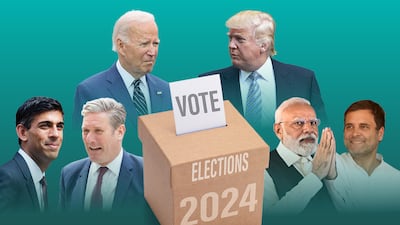The year 2024 will see the most elections held in history – in what could prove to be a decisive 12 months for the decades that follow.
More than 50 countries are going to the polls in the next 12 months for a variety of presidential and legislative elections.
And more than two billion people – about a quarter of the world's population – are eligible to vote.
The countries going to the polls include India, the world's largest democracy and most populous country, and the US, the most powerful country in the world.
Bangladesh has already gone to the polls, with the incumbent Prime Minister Sheikh Hasina securing a fifth term in elections fraught with violence and boycotted by the main opposition parties.
Some organisations have also warned that the democratic process is at risk from more threats than ever due to the rise of artificial intelligence.
The elections will be the first in many countries since generative AI tools, such as ChatGPT, became widely accessible.
“The reality of today’s technology and social media landscape paints a stark picture of platforms underprepared for the year ahead against a backdrop of unforeseen, novel challenges alongside known threats,” warned a report by the American Progress think tank, which investigated how social media impacted the 2022 US midterm elections.
Many countries are still dealing with the prolonged aftershocks of the global Covid-19 pandemic, which the World Health Organisation estimates led to approximately 14.9 million excess deaths worldwide, and the resulting unprecedented damage to the global economy.
Climate change may also play a role as an electoral issue, as countries seek to curb their emissions following the Cop28 climate conference in the UAE.
India
The world's largest democracy will vote in a general election between April and May 2024.
India is a parliamentary democracy, and its prime minister is elected by the house.
The tenure of the current lower house, the 17th Lok Sabha, is due to come to an end in June 2024.
All 543 members of parliament, who represent India's 1.4 billion people, will be up for election in a first-past-the-post system.
Prime Minister Narendra Modi is running for re-election and another five-year term.
He heads the ruling Bharatiya Janata Party Hindu nationalist party. The party's previous campaigns have rested on the pillars of political Hinduism, nationalism and welfare campaigns targeted at the country’s poorest citizens.
The combination proved a winning formula in 2014 and 2019, and the BJP is the favourite to win again in 2024.
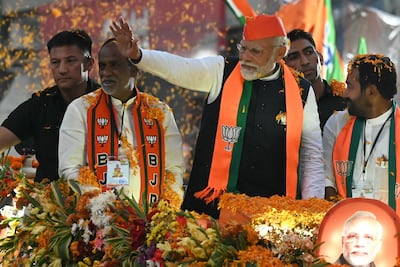
The main opposition party, the Indian National Congress, lost to the BJP in recent state elections in Madhya Pradesh, Rajasthan and Chhattisgarh, which were seen as indicators for the 2024 vote.
Congress, which has its roots in India's independence movement, will be contesting the election as part of a 28-party coalition that brings together a wide range of different political groups with differing ideologies.
The opposition accuses Mr Modi and the BJP of institutional corruption and cronyism, and presents him as a danger to the country's democratic institutions. The BJP's form of Hindu nationalism has also been criticised as driving a wedge between India's Hindu majority and minority religious groups, especially Muslims.
Recent polls showed that Mr Modi has strong personal approval ratings and is seen by many voters as having elevated India's standing on the world stage.
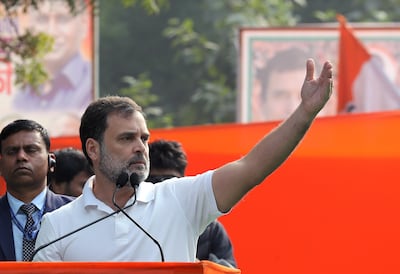
Indonesia
Campaigning is under way in Indonesia, the world's third-largest democracy and most populous Muslim-majority country.
The country will go to the polls to elect a new president on February 14.
More than 200 million people are eligible to vote in a country of nearly 280 million.
Current President Joko Widodo has served two terms and cannot stand for re-election, with three candidates vying to succeed him.
Defence Minister Prabowo Subianto is currently leading in the polls. He lost out to Mr Widodo in 2014 and 2019 but is seen as having the tacit backing of Mr Widodo. He leads the Great Indonesia Movement (Gerindra) party and has picked Mr Widodo's son and the mayor of Surakarta, Gibran Rakabuming Raka, as his running mate.
Mr Subianto is being challenged by Ganjar Pranowo, who leads the ruling Indonesian Democratic Party of Struggle. Like Mr Widodo, he is seen as a popular figure who comes from outside the political and military elite.
The third candidate in the running is Anies Baswedan, an academic and politician who was mayor of Jakarta between 2017 and 2021. He was praised for his response to Covid-19 but criticised for his handling of recent flooding in the Indonesian capital.
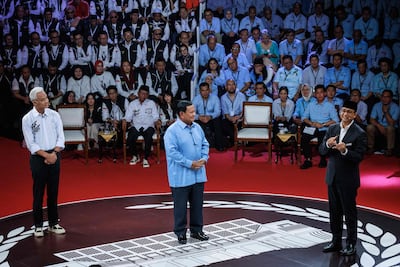
Pakistan
Pakistan is set to go to the polls on February 8 in an election riven with uncertainty.
Former Prime Minister Imran Khan has been formally disqualified from running again after being convicted of corruption charges over the alleged selling of state gifts.
But Mr Khan rejects the accusations and says he will run for election, despite being incarcerated since August.
He came to power in 2018 after his party, Pakistan Tehreek-e-Insaf, won 32 per cent of the vote and became the largest party in the country.
Mr Khan was removed from office following a no-confidence vote in April 2022. He accuses Pakistan's military establishment of orchestrating his removal.
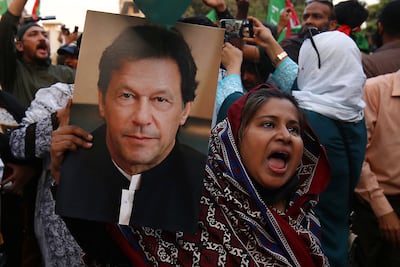
One of the PTI's main electoral rivals is the Pakistan Muslim League (Nawaz), led by former Prime Minister Nawaz Sharif and his brother Shehbaz Sharif, who succeeded Mr Khan as prime minister between April and August 2022.
Nawaz Sharif served three non-consecutive terms as prime minister and was in exile until this year, after being sentenced to 10 years in prison for corruption in 2018.
The PTI and PML-N will be challenged by the Pakistan People's Party, run by the Bhutto dynasty, whose power base is in the southern Sindh province. A host of other parties are also expected to win votes.
The state of Punjab contains 141 of the 342 seats in the assembly and is seen as a crucial battleground.
Pakistan's democracy has been interrupted by several coups, and the military has been accused of interfering in politics and influencing the results of elections.
Turkey
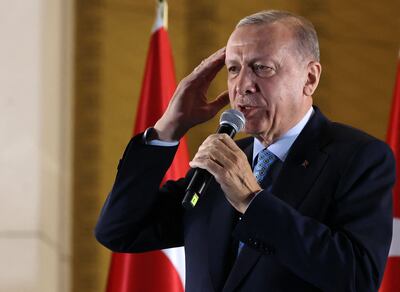
Local elections are being held across Turkey in March 2024.
President Recep Tayyip Erdogan is flying high after winning re-election this year.
Mr Erdogan defeated opposition candidate Kemal Kilicdaroglu in a presidential run-off in May. The election had been billed as the opposition's strongest chance to dethrone Mr Erdogan, who has dominated Turkish politics for 20 years as prime minister and then President since 2014.
But Mr Erdogan triumphed with 52.18 per cent of the vote, despite critics blaming his economic policies for crashing the Turkish lira and exacerbating the country's cost of living crisis.
His AKP party also won the most seats in the parliamentary elections.
However, the opposition Republican People's Party (CHP) controls the councils of the capital Ankara and largest city Istanbul, both of which are up for election this March.
Istanbul alone has a population of almost 16 million people, and its mayor has an influential voice.
The city's current mayor, the CHP's Ekrem Imamoglu, is an outspoken critic of Mr Erdogan and seen as a leading opposition figure, but he may not be able to stand for re-election.
Mr Imamoglu was sentenced by a Turkish court to two years and seven months in prison for insulting officials on the country's electoral council. The case is currently in the appeals process but could effectively ban him from standing in the contest.
Mr Imamoglu rejects the verdict and has previously said it “proved that there is no justice in today’s Turkey”.
Control of Turkey's third-largest city, Izmir, is also up for grabs.
Aside from local issues, Turkish voters are expected to consider the economy, which is suffering from rampant inflation, as well as migration and a potential restoration of ties with Syria's President Bashar Al Assad.
US
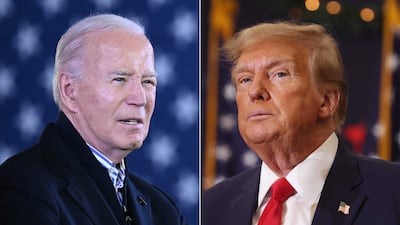
The 2024 US presidential election will take place on November 5.
Neither the Democrats nor Republicans have yet formally chosen their candidate for the election, but it is likely to see a repeat of the 2020 contest, with President Joe Biden running for re-election against former president Donald Trump.
The Republican Party primaries will take place between January and June. Mr Trump is seen as the runaway favourite to win the nomination despite challenges from former UN ambassador Nikki Haley, Florida Governor Ron DeSantis and others.
Playing an equal role in the 2024 presidential election will be the US court system. Mr Trump faces four felony trials in as many jurisdictions ranging from his mishandling of classified documents to attempting to overturn the results of the 2020 election, charges which he denies.
The first of these trial dates has been scheduled for March 4, a day before "Super Tuesday", one of the most important dates on the Republican primary calendar.
No serious challenge to Mr Biden from within the Democratic Party has emerged and the President is likely to contest the 2024 election, despite concerns over his age.
Mr Biden is 81, making him the oldest president in US history, while Mr Trump is 77.
The economy is seen as the defining issue for US voters, with opinion split on how voters will assess Mr Biden's performance over the past four years.
Immigration, abortion and culture war fights are among a range of other domestic issues at stake.
Opinion polls put Mr Biden and Mr Trump neck and neck, although these have been notoriously unreliable in the past.
UK
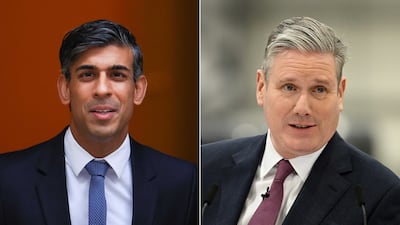
Britain will have its first general election in five years in 2024, with the ruling Conservative Party looking like they are heading towards defeat.
Prime Minister Rishi Sunak has confirmed the poll will happen within the next 12 months, but it is now a question of whether he will call it in the spring or autumn.
With the Conservatives consistently more than 15 points behind in opinion polls, most political analysts believe that he will delay until the later date, probably in October.
Mr Sunak’s hope is that the next 10 months will see a significant improvement in the economy with inflation further dropping and prosperity growing giving him a chance to remain in Downing Street.
But he faces significant headwinds getting his Rwanda deportation law through parliament with right-wing Conservatives thinking it not tough enough and liberal Tories thinking it is too harsh.
That will almost certainly mean more in-fighting, which is unlikely to endear the Tories to a country still recovering from the turbulence of the Brexit vote in 2016.
The coming internal ructions will only increase the lead of Keir Starmer’s Labour Party, which has been in opposition for 13 years.
If Mr Sunak loses the election, then that will likely trigger yet another Conservative leadership contest.
